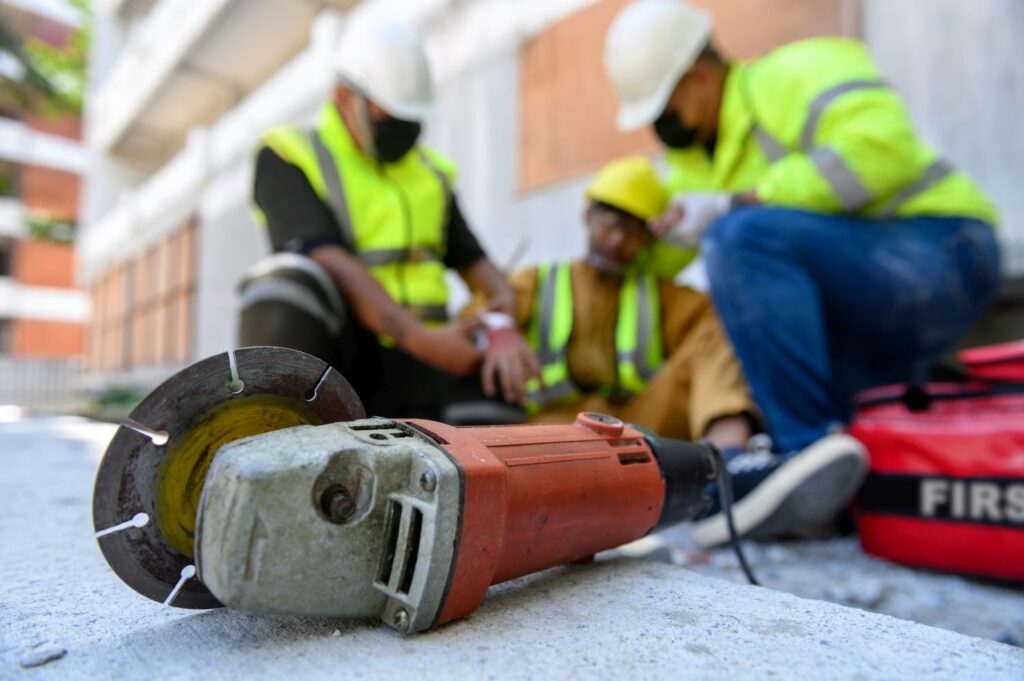Table of Contents
Workplace Injuries: Navigating the Complex Path to Justice with SK Legal’s Workplace Injury Lawyers
Workplace injuries can happen in any environment, whether it’s a construction site, an office, or a retail store. Every year, thousands of employees are injured while performing their duties, leading to a range of physical, emotional, and financial challenges. Unfortunately, dealing with the aftermath of a workplace injury is often more complicated than it seems. Filing a claim, managing medical treatments, handling lost wages, and navigating appeals can be a difficult and stressful process.
At SK Legal, our dedicated workplace injury lawyers understand the intricacies of workers’ compensation law and how to handle the specific challenges injured workers face. We are committed to helping you navigate the complexities of workplace injury claims and ensuring that you receive the compensation and support you deserve.
In this post, we will explore the various types of workplace injuries, the steps to take if you are injured on the job, the legal complexities involved, and how workplace injury lawyers at SK Legal can help you secure the compensation you are entitled to.
Common Types of Workplace Injuries
Workplace injuries can vary significantly depending on the type of job, but some of the most common injuries include:
1. Slips, Trips, and Falls
One of the most frequent causes of workplace injuries, slips, trips, and falls can happen in any environment. Whether it’s a wet floor, loose carpet, or uneven surface, these incidents can lead to sprains, fractures, and head injuries.
2. Repetitive Strain Injuries (RSIs)
Workers who perform repetitive tasks, such as typing, lifting, or assembly line work, may suffer from RSIs like carpal tunnel syndrome or tendonitis. These injuries can develop gradually over time and may require long-term medical treatment or rehabilitation.
3. Heavy Machinery Accidents
Jobs that involve heavy machinery, such as construction or manufacturing, carry a higher risk of serious accidents. Injuries caused by heavy machinery can range from cuts and burns to more severe outcomes like amputations or crush injuries.
4. Workplace Violence
Violence in the workplace, whether from coworkers or external threats, can result in both physical injuries and emotional trauma. Employees in high-risk environments, such as healthcare workers, may be especially vulnerable to such incidents.
5. Exposure to Hazardous Substances
In certain industries, workers may be exposed to hazardous chemicals, toxic fumes, or other dangerous substances. Prolonged exposure can lead to long-term health issues such as respiratory conditions, skin diseases, or even cancer.
6. Overexertion Injuries
Overexertion injuries occur when workers push their bodies beyond their limits, often due to heavy lifting, carrying, or strenuous physical labor. These injuries can result in muscle strains, ligament damage, and joint injuries.
Steps to Take After a Workplace Injury
If you are injured at work, the immediate steps you take can significantly impact the outcome of your claim. It is crucial to follow these steps to ensure that you are protecting your legal rights:
1. Seek Immediate Medical Attention
Your health should always be the top priority. If you are injured, seek medical attention right away. Not only is this important for your recovery, but prompt medical documentation is also critical for your workers’ compensation claim. Make sure to inform your healthcare provider that your injury is work-related so that it can be properly recorded.
2. Report the Injury to Your Employer
Once you are safe, report the injury to your employer as soon as possible. Many workplaces have a formal process for reporting injuries, and delaying this step could negatively affect your claim. Ensure that your employer files an official report with the workers’ compensation board.
3. Keep Detailed Records
Maintain a thorough record of all medical visits, treatments, and expenses related to your injury. This includes keeping receipts for medications, physical therapy, and transportation costs associated with medical visits. Additionally, note any time you are unable to work due to your injury.
4. File a Workers’ Compensation Claim
Your next step is to file a workers’ compensation claim with your employer’s insurance provider. This claim will cover medical bills, lost wages, and other expenses related to your injury. However, the process can be complicated, and having a skilled workplace injury lawyer on your side can make all the difference.
5. Consult a Workplace Injury Lawyer
Navigating workers’ compensation laws can be difficult, especially if your claim is denied or disputed. Having an experienced workplace injury lawyer on your side will not only reduce your stress but also improve your chances of receiving the compensation you deserve. SK Legal’s team of workplace injury lawyers will ensure that all aspects of your case are handled professionally and efficiently.
Workers’ Compensation Claims: What to Expect
The process of filing and managing a workers’ compensation claim can be overwhelming. Here’s a breakdown of what to expect:
1. Initial Decision-Making by the Board
After you file your claim, the workers’ compensation board will review the evidence and decide whether to accept or deny your claim. The board may consult with your employer, review medical records, and even request that you attend a medical assessment. Unfortunately, it is not uncommon for claims to be denied, especially if the board believes the injury is unrelated to work or that the injury does not meet the criteria for compensation.
2. Appeals Process
If your claim is denied, you have the right to appeal the decision. This is where having a workplace injury lawyer becomes invaluable. The appeal process can be lengthy and requires comprehensive legal submissions and supporting evidence. There are multiple levels of appeal, including internal reviews by the compensation board and external reviews by independent tribunals.
3. Medical Assessments and Wage Calculations
Throughout your case, you may be required to attend medical assessments by third-party contractors hired by the workers’ compensation board. These assessments can significantly influence the outcome of your claim, including determining the extent of your injuries and calculating your wage loss benefits. If you are found to have a permanent disability, additional long-term compensation may be provided.
Why Claims are Denied and How SK Legal Can Help
Unfortunately, workers’ compensation boards often operate like insurance companies to minimize the amount they pay out. Claims may be denied for various reasons, including:
- Lack of sufficient medical evidence
- Disputes over whether the injury occurred at work
- Allegations that the worker’s actions contributed to the injury
- Failure to file the claim within the required timeframe
At SK Legal, our workplace injury lawyers are dedicated to helping you overcome these obstacles. We can assist you at every step, from gathering medical evidence to drafting compelling legal submissions. If your claim is denied, we can guide you through the appeals process and help you fight for the compensation you deserve.

What does a workplace injury lawyer do?
A workplace injury lawyer helps employees navigate workers’ compensation claims, appeal denied claims, and ensure that they receive proper compensation for medical bills, lost wages, and long-term disability.
Do I need a lawyer if my workers’ compensation claim is denied?
Yes, a lawyer can significantly improve your chances of a successful appeal. They will help gather evidence, file necessary paperwork, and represent you in hearings.
What kind of compensation can I receive for a workplace injury?
Compensation typically includes coverage for medical bills, lost wages, rehabilitation costs, and, in some cases, long-term disability benefits.
How much does it cost to hire a workplace injury lawyer?
Most workplace injury lawyers work on a contingency fee basis, meaning they only get paid if you win your case. SK Legal offers a free initial consultation to assess your case.
What should I do if my employer pressures me to return to work before I’m ready?
If your employer is pressuring you to return to work despite your injury, consult a workplace injury lawyer immediately. You have the right to recover fully before resuming work.
Can I sue my employer for a workplace injury?
In most cases, you cannot sue your employer directly. Workers’ compensation laws typically prevent lawsuits in exchange for guaranteed benefits. However, a workplace injury lawyer can help you explore all available options.
What if my injury was caused by someone other than my employer?
If a third party, such as a contractor or equipment manufacturer, is responsible for your injury, you may have the right to file a personal injury claim in addition to your workers’ compensation claim.
How long do I have to file a workers’ compensation claim?
Filing deadlines vary by jurisdiction, but it is important to file your claim as soon as possible after the injury occurs. SK Legal’s workplace injury lawyers can help ensure you meet all deadlines.
What if I can no longer perform my job due to my injury?
If your injury prevents you from returning to your previous job, you may be eligible for vocational rehabilitation services or long-term disability benefits.
How can SK Legal help me with my workplace injury claim?
SK Legal’s workplace injury lawyers have extensive experience in handling workers’ compensation claims. We can assist you with every aspect of your case, from filing the initial claim to representing you in appeals and hearings.
- Contract Law Across Countries (Canada and United States)
- Cross Border Services (United States and Canada)
- SK Legal – Contingency Engagements for 100% Success – Serving all of British Columbia and Alberta
- Navigating Personal Injury Claims with SK Legal as Your Trusted Lawyer in Alberta
- SK Legal: Assisting Tenants with Landlord/Tenant Disputes in Alberta and British Columbia, Canada

